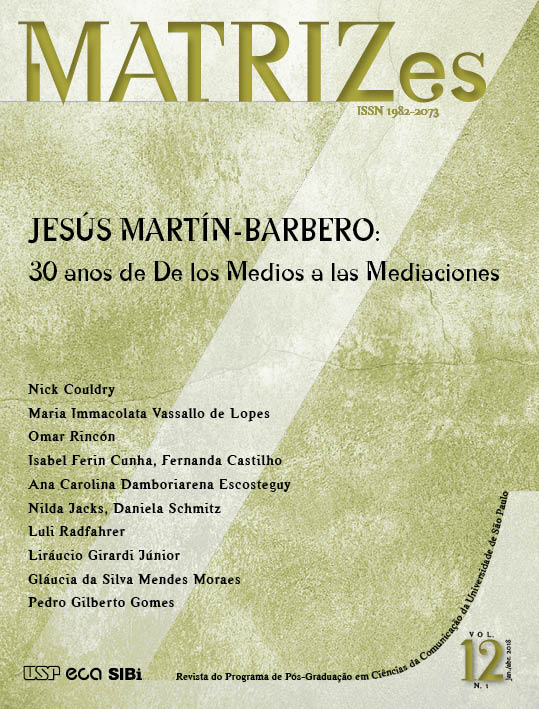The medium is the mediation: postphenomenological views on datacratic contexts
DOI:
https://doi.org/10.11606/issn.1982-8160.v12i1p131-153Keywords:
Postphenomenology, science and technology studies, digital culture, communication epistemology, datacracyAbstract
As technological innovations transform communication processes, Jesus Martín-Barbero’s Theory of Mediations continues to play a fundamental role in the epistemological debates about the environment of communications in interactive networks. Social media, which, according to a postphenomenological approach, have intentionality and moral agency, have become the preferential mediations of contemporary communications, turning collective environments into datacracies, regimes in which databases and algorithms have great influence on decision making. The Theory of Mediations, by evidencing the importance of the communicative nature of Culture, is essential for the identification of the influence of communication in contemporary ideological formation.
Downloads
References
ASIMOV, I. The caves of steel. New York: Doubleday, 1954.
BENJAMIN, Walter. The work of art in the age of its technological reproducibility and other writings on media. London: Harvard University Press, 2008.
BOGOST, I. The cathedral of computation. The Atlantic, Washington, D.C., 15 jan. 2015. Disponível em: <https://goo.gl/q1snJz>. Acesso em: 27 ago. 2017.
BREY, P. From moral agents to moral factors: the structural ethics approach. In: KROES, P.; VERBEEK, P. (Eds.). The moral status of technical artefacts. Dordrecht: Springer, 2014. p. 125-142.
CANCLINI, N. G. Culturas híbridas. 4. ed. São Paulo: Edusp, 2003.
ECO, U. Obra aberta: forma e indeterminação nas poéticas contemporâneas. São Paulo: Perspectiva, 1979.
GIBSON, W. Neuromancer. New York: Ace Books, 1984.
HABERMAS, J. Knowledge and human interests. Boston: Beacon Press, 1968.
HEIDEGGER, M. The question concerning technology & other essays. New York: Garland, 1977.
INTRONA, L. D. Towards a post-human intra-actional account of sociomaterial agency (and morality). In: JOHNSON, C. The information diet. San Francisco: O’Reilly Media, 2015. p. 31-53.
JASPERS, K. The atom bomb and the future of man. Chicago: University of Chicago Press, 1961.
KELLY, K. What technology wants. New York: Penguin Group, 2010.
KING, S. Under the dome. New York: Scribner, 2009.
KROES, P.; VERBEEK, P. (eds.). The moral status of technical artefacts. Dordrecht: Springer, 2014.
LATOUR, B. Reassembling the social: an introduction to actor-network theory. New York: Oxford Press University, 2005.
LUEPNITZ, D. Schopenhauer’s porcupines: intimacy and its dilemmas: five stories of psychotherapy. New York: Basic Books, 2003.
MANOVICH, L. The algorithms of our lives. The Chronicle of Higher Education, Washington, D.C., 16 dez. 2013. Disponível em: <https://goo.gl/oAvjTK>. Acesso em: 27 ago. 2017.
MARTÍN-BARBERO, J. Dos meios às mediações: comunicação, cultura e hegemonia. Rio de Janeiro: Editora da UFRJ, 1997.
______. As formas mestiças da mídia: entrevista concedida a Mariluce Moura. Revista Pesquisa Fapesp, São Paulo, n. 163, p. 10-15, set. 2009.
MCLUHAN, M. Understanding media: the extensions of man. London: MIT Press, 1994.
MOROZOV, E. To save everything, click here. New York: PublicAffairs, 2013.
MUMFORD, L. Technics and civilization. Chicago: University of Chicago Press, 2010.
PARISER, E. The filter bubble: what the Internet is hiding from you. New York: Penguin Press, 2011.POSTMAN, N. Technopoly: the surrender of culture to technology. New York: Vintage Books, 1993.
RAGON, M. Histoire de la littérature proletarienne en France. Paris: Albin Michel, 1974.
TAYLOR, F. Princípios de administração científica. 8. ed. São Paulo: Atlas, 2010.
VERBEEK, P. Some misunderstandings about the moral significance of technology. In KROES, P., VERBEEK, P. (Eds). The moral status of technical artefacts. Dordrecht: Springer, 2014. p. 75-88.
WEBER, M. The sociology of religion. Boston: Beacon Press, 1971.
ZHAO, J. et al. Men also like shopping: reducing gender bias amplification using corpus-level constraints. In: CONFERENCE ON EMPIRICAL METHODS IN NATURAL LANGUAGE PROCESSING, 2017, Copenhagen. Proceedings... 2017. Disponível em: <https://goo.gl/K3abry>. Acesso em: 28 ago. 2017.
Downloads
Published
Issue
Section
License
Authors who publish in this journal agree to the following terms:
- Authors retain the copyright and grant the journal the right to first publication, with the work simultaneously licensed under the Creative Commons Attribution License (CC BY-NC-SA 4.0) which allows sharing of the work with acknowledgment of authorship and initial publication in this journal for non-commercial purposes.
- Authors are authorized to assume additional contracts separately, for non-exclusive distribution of the version of the work published in this journal (eg, publishing in institutional repository or as a book chapter), with acknowledgment of authorship and initial publication in this journal.






















